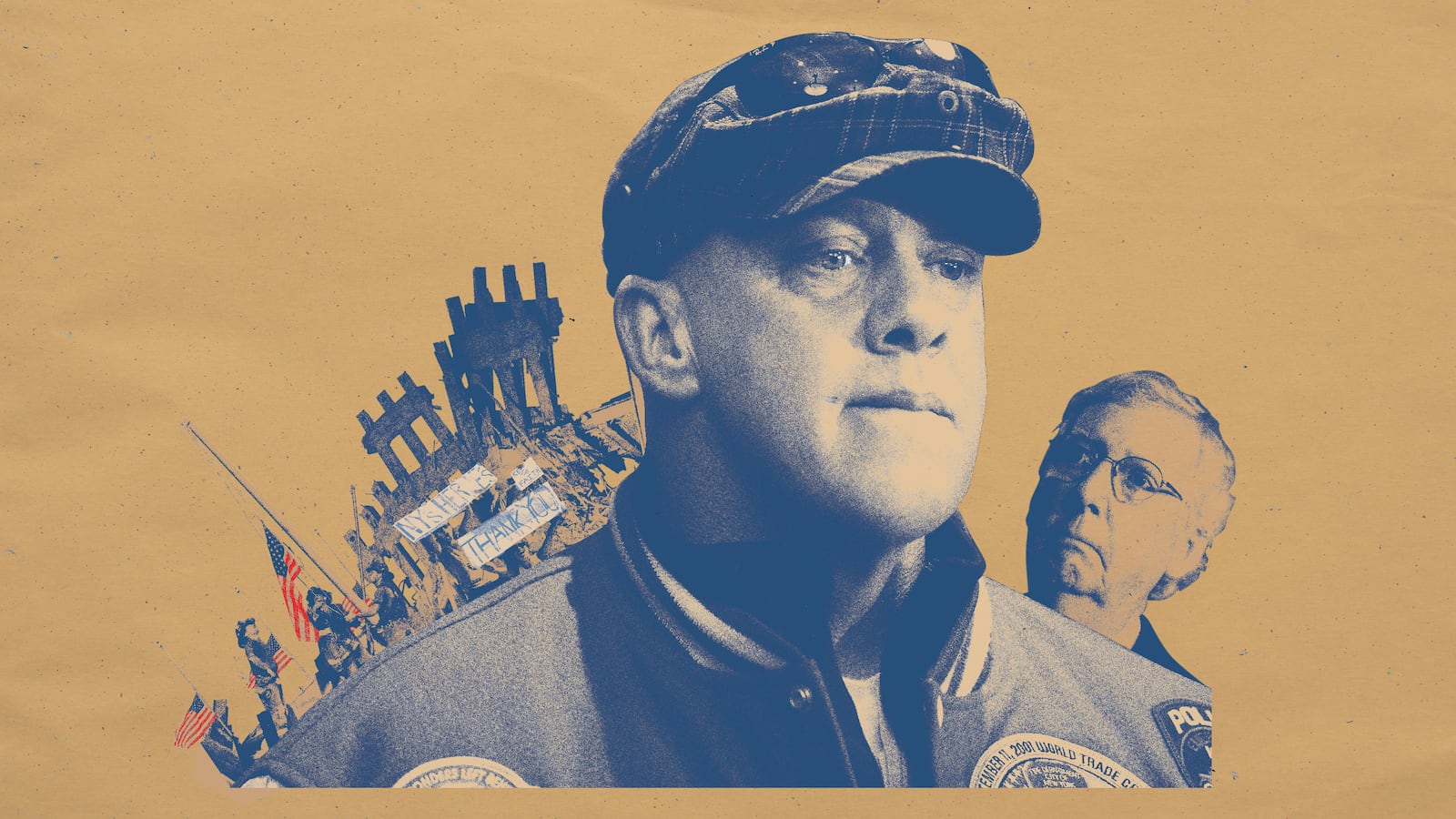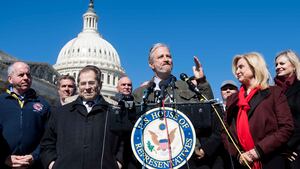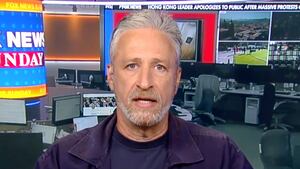Chuck Schumer credits Jon Stewart as a key strategist behind the push for a permanent 9/11 fund. But if you ask Stewart, the driving force was a construction worker from Nesconset, Long Island, who called Mitch McConnell an asshole on television—and got him to go along anyway.
The man is John Feal, who had his foot crushed at Ground Zero in September 2001. He went on to spend the next 18 years fighting, first against a system that failed to work for him, and then for other survivors, responders, and victims whom U.S. officialdom seemed intent on forgetting, regardless of their hashtags and bumper stickers.
Feal would call many other people assholes and worse along the way, angering even friends. But the way he saw it, a political system that couldn’t move to respond to the responders who gave everything to restore America needed to be kicked. A man who now has half a left foot proved to be the right one to do it.
“His passion and his energy forced them to make the moral choice, and as simple as it sounds, to do the right thing,” Stewart said. “He refused to give up... He carried them through, at every turn. This thing could have died a thousand deaths, and he wouldn’t let it happen.”
The bill, which will guarantee compensation for 9/11 victims and responders, passed the Senate on Tuesday by a vote of 97 to 2. But the seeds of its success were planted in June when Stewart excoriated members for failing to show up at a hearing before the Judiciary Subcommittee on the Constitution and Civil Justice, while dying NYPD Det. Luis Alvarez had to trek to D.C. a day ahead of what would have been his 69th round of chemotherapy.
Stewart hadn’t planned to unleash on the lawmakers in quite the way he did. But Feal had. He’d grown close to Stewart in 2010 when the first 9/11 health and compensation act barely passed, and Stewart memorably had four responders on The Daily Show.
Stewart had gotten increasingly connected to and concerned about the 9/11 community, delivering the eulogy for Firefighter Ray Pfeifer after meeting him in the campaign to renew the 9/11 programs in 2015. Pfeifer left a deep impression on Stewart. Feal knew that intimately. And so, when it came time to talk to lawmakers about the next bill reauthorization, he didn’t want Stewart to just read a statement he’d prepared with guidance from Hill staffers.
He wanted Stewart to speak purely from the heart, so he primed him. He gave him a note in the morning about how much Pfeifer and Stewart’s friendship meant to him. Just before going into the hearing room, Feal and former FDNY firefighter Kenny Specht presented the comedian with the fire coat Pfeifer had worn on his first job. Feal had bought it at a charity fundraiser the night before. He had dozens of responders sign it as a sign of thanks.
“I knew I was getting to him. I knew he was just a bowl of Jello,” Feal said.
In the hearing, Stewart was scheduled to go last. And as the proceedings progressed, Feal kept working on Stewart, pointing to the packed audience and empty chairs of representatives.
“He was just festering. I said, ‘Put the piece of paper away, and do what you do best,’” Feal recalled. “I think that moment was where we changed course. I think that’s where we took matters into our own hands. And I saw a window where we could get this done before the August recess, and I knew we didn’t have to wait until November, December like everyone else wanted.”

John Feal hugs Jon Stewart during a House Judiciary Committee hearing on reauthorization of the September 11th Victim Compensation Fund on Capitol Hill on June 11, 2019.
Zach Gibson/GettyThat “everyone else” referred in part to members of Congress and staffers who were actually working hard to pass the bill. Lawmakers were not pleased that Stewart had excoriated them. And Democratic subcommittee chair Rep. Steve Cohen (D-TN) let Stewart know it. Cohen chastised him, saying it was just a subcommittee with fewer members and that others who weren’t there still cared about the issue.
But Feal was prescient. Several moments from that hearing went viral, chief among them Stewart’s evisceration of the politicians on the dais, and the earlier gift of Pfeifer’s bunker coat.
Even before the hearing, Feal had been working on getting a meeting with McConnell, which some of his supporters didn’t think he’d ever land, having savaged McConnell for holding up 9/11 legislation in 2015 and 2010. A meeting seemed even less likely after Stewart, at least obliquely, singled out McConnell’s actions again in his testimony.
Feal called the majority leader’s office again right after the hearing. He was transferred to a scheduler.
“We were aggressive, we put people on the spot, we called them out,” Feal said. “Yeah, I dropped a couple of a-bombs. But everything was premeditated.”
The meeting with McConnell came less than two weeks later. At that point, Alvarez lay dying in a hospice on Long Island. But he wanted Feal to bring the Kentucky Republican his detective shield to hammer home what the bill meant.
Attendees described the meeting in ways that suggest a surreal blend of group therapy, venting, and a bit of barely contained anger management. The plan going in had been to let McConnell talk, then deal with any issues he raised. But the responders didn’t wait, and poured out close to 20 minutes of frustration, starting with Specht and capped by Feal, who twice stopped McConnell from interrupting.
Eventually, when the leader of the Senate was allowed to speak, he told them he had no need to rehash what they or Stewart may have said about him in the past, or to reaffirm their goals.
“I get it. We don’t have to talk about it. I understand,” one of the attendees paraphrased McConnell saying.
Then Feal gave him Alvarez’s badge.
“He got watery-eyed. His eyes filled with water,” Feal said nearly a month later, a note of surprise still in his voice. “I don’t know if there is a soul in there, but he’s made up of water just like everybody else.”
McConnell pledged to advance the bill by, at the very latest, the start of Congress’ annual August recess.
He did not specify how, but his promise showed that there was growing momentum behind the bill. In both 2010 and 2015, passage had come down to the last minute. This time seemed different. Suddenly obstacles were evaporating.
One major hurdle the sponsors of the bill were wrestling with was how to pay for the billions it was expected to cost. But House Speaker Nancy Pelosi (D-CA) saw the sentiment surging behind the legislation and decided to put the bill up for a vote on the House floor with no offsets. There was a chance Republicans would balk, but the main sponsors, Reps. Carolyn Maloney (D-NY), Pete King (R-NY), and Jerry Nadler (D-NY), had pushed hard to get more than 330 backers even before the cost was known. They wanted to make it tough for lawmakers to back out if they thought it was too expensive.
If Republicans didn’t like it, it would be on them to object. Before the vote took place in the House, Feal and responders met in Pelosi’s office. Feal put the over-under of yes votes at 390, and bet the over. The tally ended up being 402, with only 12 Republicans opposing the measure.
“Pelosi still owes me a dollar,” Feal said.
After the vote, Pelosi passed Feal and Stewart as they were doing interviews just off the House floor.
“She gives me a hug and she whispers in my ear, she’s like, ‘You are the toughest SOB I’ve ever dealt with while I’ve been here.’ And then she smiles, turns to the camera, and says, ‘John Feal is right, we work for them.’ But the fact that she said that, I’ll take that,” Feal said. “Whether she meant it or not, who gives a fuck? She said it.”

John Feal stands in front of Sen. Charles Schumer (D-NY) while attending a news conference celebrating the passage of the James Zadroga 9/11 Health and Compensation Act near Ground Zero in New York on Dec. 23, 2010.
Lucas Jackson/ReutersThe last two threats to the bill came in during the last week, from Sens. Rand Paul (R-KY) and Mike Lee (R-UT). The two senators had decided to block a unanimous consent request by the lead Senate sponsor, Sen. Kirsten Gillibrand (D-NY), that would have sent the bill straight to President Trump’s desk.
Paul wanted offsets to the new spending. Lee wanted to cap the bill at the Congressional Budget Office’s lowball estimate of $10.2 billion in 10 years, plus $10 billion until 2092. Such a provision would have all but assured future Luis Alvarezes would have to make the painful pilgrimage to Capitol Hill again and again.
Their objections were both surprising and not at all. Responders and Stewart had found both senators unpleasant to deal with in 2015.
“They’re incredibly arrogant. And they act like we’re doing something wrong,” Stewart said, referring to Paul’s office in particular. “I hope one day he finds his libertarian paradise, but please don’t find it today when we’re at the end of a 15-year fight.”
Stewart relayed that Paul hadn’t even gone to the meeting with responders back in 2015, sending his staffers there instead. And while Lee at least showed up, he ended up leaving a poor impression.
“He was not weird—bizarre,” said Stewart. “He wanted to hear stories. One of the guys told him he was in the South Tower when it collapsed, you know, barely got out, and he smiled at the guy and said, ‘Oh, I bet you’ve got some stories.’”
Specht recalled Lee being obsessed with those details. “He asked, ‘What did it sound like?’” Specht said. “We walked out of there looking at each other, saying, ‘That was creepy, right?’”
Lee did not sponsor the 2015 bill. But the crew met with his staff again this past March, this time presenting a thick book of data and background on the Victim Compensation Fund to Lee’s counsel, Phil Alito, who is the son of Supreme Court Justice Sam Alito.
According to a written log Feal’s people kept on the meeting, Alito said Lee would not block the bill. Indeed, when Specht emerged from Lee’s office, he told a reporter, “Lee won’t co-sponsor, but his staff said he wouldn’t stand in the way. So I count that as a big win.”
Weeks later, Lee threw a wrench in the bill’s passage. Though Paul did the actual objecting, Lee raised concerns of his own. A spokesman insisted that he needed consideration of an amendment to tackle his concerns about fraud and abuse along with more time to look into the bill. He got both, and voted against the bill anyway.
The move angered advocates, including Stewart.
“These guys are like, ‘We want to take a look at this.’ And you’re like, ‘We’ve been in your office for 10 years. We sat there with you personally and handed you all the information—I was in the room. Like, are you insane?’” Stewart said.
“That delay will cost real people heartache, they’ll get letters saying their compensation is cut 70 percent,” Stewart said. Indeed, back in February, the Department of Justice official who runs the compensation fund, Special Master Rupa Bhattacharyya, slashed payments to victims of 9/11 and their families because money was running out far ahead of the planned end of the fund in 2020. Hundreds of compensation checks were deeply slashed.
On Tuesday, Lee and Paul were the only senators to stand in the way. Feal, in a moment of gloating, addressed the two holdouts. “We whipped your ass, 97 to 2. When does the Senate ever get that?” As for McConnell, however, he made sure to say thanks. “He kept his word to me,” Feal said. “Everything he said, he did.”
In getting to this point, Feal and Stewart know they angered some of their allies in Congress, including staffers whom Feal and Stewart depended on for strategy and advice on the ins and outs of Capitol Hill. They also acknowledge the legislation would have failed without all the work that those legislative aides did in getting the bill moving through Congress.
But many of the insiders wanted a less confrontational approach that played up the growing bipartisan spirit around the bill. And Feal and Stewart did not think the families of dying responders and victims should have to wait.
“The way that we have always won is by exposing their procedures to the sunlight. And when the outside world glimpses how things are done, and how they handle issues like this, they’re appalled,” Stewart said. “And that’s the power that puts pressure on them. It’s not us, it’s the risk that the curtain will be pulled back and that people will see and pay attention to exactly how deep the corruption runs within the government process.”
For nearly 15 years, Feal and others at his FealGood Foundation have been organizing trips to Washington, coordinating hotels, transportation for wheelchairs, medication schedules, and soothing the fears of spouses sending their loved ones down I-95.
Feal recalls the importuning that often accompanied those journeys. “Make sure my husband takes his medication, make sure he doesn’t drink with the medication, keep an eye on him, do not let him die on you,” Feal said. “That’s every trip.”
The trip Tuesday was different. There was still plenty of organizing that had to go on, but it was to watch a win, a win tempered by the knowledge that some of the people who won the fight are now in their graves.
Feal hopes at least the trips have ended, because the deaths from exposure to the horrors unleashed on that day in 2001 won’t stop for a long time.
“This wasn’t about the legislation anymore. It was about the friendships,” Feal said. “That’s what matters.”








